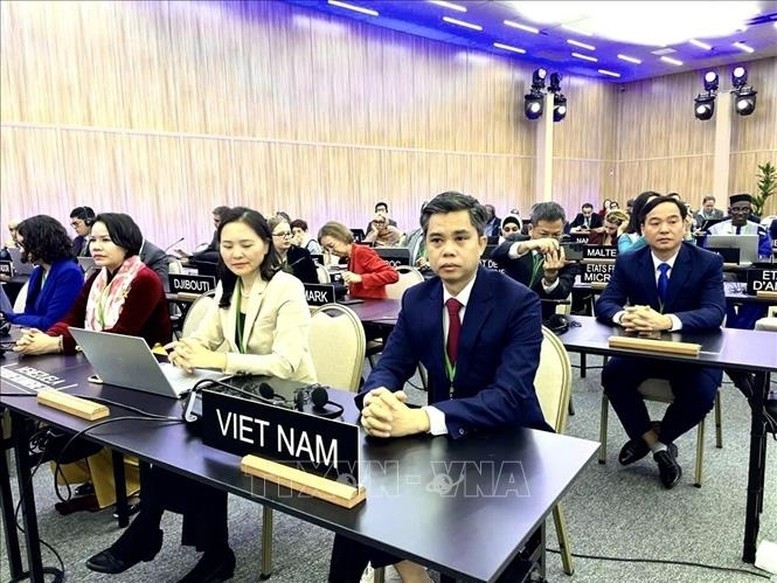The country was also elected a Vice President of the 42nd session, representing the Asia-Pacific, in 2023.
Being entrusted with this role for two consecutive terms underscores Vietnam’s growing stature, credibility, and contribution capacity at global multilateral institutions. It also reflects the international community’s confidence in the country’s proactive and responsible engagement, as well as its leadership capacity within UNESCO.
    |
 |
|
The Vietnamese delegation at the 43rd session of UNESCO’s General Conference |
The General Conference is UNESCO’s highest governing body, comprising all 194 member states. It holds the authority to decide on the organization’s strategic issues, including directions, policies, cooperation programs, medium-term budget, and the election of its governing bodies.
Vietnam’s election as a Vice President enables the country to make more substantive contributions to UNESCO’s policy-making, coordination, and implementation of initiatives across education, culture, natural and social sciences, and information and communications.
The Vietnamese delegation, led by Deputy Minister of Foreign Affairs Ngo Le Van, is actively participating in the session, which runs from October 30 to November 13.
Speaking at the high-level plenary session on November 4, Van commended UNESCO’s role and contributions over the past 80 years since its establishment in 1945 in promoting peace, mutual understanding among nations, and sustainable development worldwide.
He emphasized that UNESCO should further leverage its unique role, strengthen multilateralism and international solidarity, and promote innovative and inclusive approaches.
On this occasion, the official highlighted Vietnam’s key policies and initiatives in education, culture, and science.
Vietnam affirms that culture must serve as a pillar of peace, progress, and prosperity, as well as a fundamental and endogenous driver of sustainable development, he said.
In this spirit, Vietnam proposes that UNESCO recommend the United Nations soon launch an “International Decade of Culture for Sustainable Development,” he said, adding at the national level, Vietnam is formulating a resolution on revitalizing and developing Vietnamese culture in the new era.
Recalling the signing ceremony of the U.N. Convention against Cybercrime held in Hanoi in October, along with events marking the 50th anniversary of the Intergovernmental Hydrological Program (IHP) and 60 years of Water Sciences at UNESCO, he said they demonstrate Vietnam’s commitment and determination to actively contribute to global efforts in promoting digital security and water security.
The official also highlighted Vietnam’s recent contributions to UNESCO’s network of designated titles, including Ho Chi Minh City’s recognition as a Creative City in film category in October, and UNESCO’s decision to honor and jointly commemorate the 300th birth anniversary of Le Quy Don, one of Vietnam’s greatest cultural figures and scholars.
This is not only a source of pride for Vietnam but also a tribute to the universal values of cultural diversity and creativity, he noted.
On this occasion, Van met with UNESCO leaders and head delegates from several member states to discuss ways to strengthen cooperation between Vietnam and UNESCO, as well as with other countries. He also sought support for Vietnam’s initiatives and nominations for UNESCO titles.
International partners highly valued Vietnam’s socio-economic achievements and its increasingly active and substantive contributions to UNESCO, the U.N., and other multilateral forums.
Source: VNA